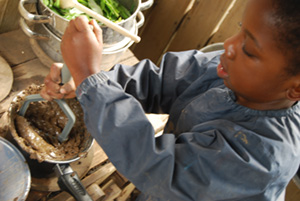Young children build up an understanding of the world around them through a variety of play activities. This includes the use of digital technology. It is important, therefore, that all children become confident with this media in early years settings, especially those who do not have access to technology at home.
Digital resources need to be part of the learning environment of the current generation of children, in which the balance needs to be struck between technological confidence and screen time.
As manufacturers of early years resources, we are aware that tablet technology is readily available to young children. We are fascinated by the ways in which it adds value to the learning process, and the opportunities it offers to individual learners. We believe that such positive contributions are possible with appropriate practitioner engagement and software at the right developmental level.
Continue reading…

 Register/Log in
Register/Log in
 Basket
Basket
 Speech and Language Therapist Wendy Lee shares with us her advice and suggestions for checking out children’s early speech and language skills. Wendy has worked as a speech and language therapist for 30 years and until recently was Professional Director at The Communication Trust. Wendy’s passion is for all children to be able to communicate to the very best of their ability. She is currently working independently, with schools, settings and national organisations on all things speech, language and communication.
Speech and Language Therapist Wendy Lee shares with us her advice and suggestions for checking out children’s early speech and language skills. Wendy has worked as a speech and language therapist for 30 years and until recently was Professional Director at The Communication Trust. Wendy’s passion is for all children to be able to communicate to the very best of their ability. She is currently working independently, with schools, settings and national organisations on all things speech, language and communication. Have you ever stopped to think of the dramas taking place in your setting’s outdoor space? Just like EastEnders or Downton Abbey, there is so much going on, even excluding the children’s dilemmas:
Have you ever stopped to think of the dramas taking place in your setting’s outdoor space? Just like EastEnders or Downton Abbey, there is so much going on, even excluding the children’s dilemmas: